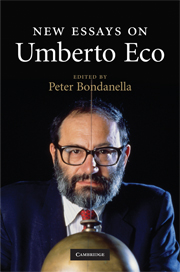Book contents
- Frontmatter
- Contents
- Notes on contributors
- Preface
- Acknowledgments
- 1 Eco and popular culture
- 2 Eco's semiotic theory
- 3 Eco's scientific imagination
- 4 From the Rose to the Flame: Ecos theory and fiction between the middle Ages and postmodernity
- 5 Eco's middle Ages and the historical novel
- 6 Eco and the tradition of the detective story
- 7 “The subject is in the adverbs.” The role of the subject in Eco's semiotics
- 8 Double coding memorabilia in The Mysterious Flame of Queen Loana
- 9 Eco and Joyce
- 10 Eco on film
- Selected bibliography on Eco
- Index
6 - Eco and the tradition of the detective story
Published online by Cambridge University Press: 26 January 2010
- Frontmatter
- Contents
- Notes on contributors
- Preface
- Acknowledgments
- 1 Eco and popular culture
- 2 Eco's semiotic theory
- 3 Eco's scientific imagination
- 4 From the Rose to the Flame: Ecos theory and fiction between the middle Ages and postmodernity
- 5 Eco's middle Ages and the historical novel
- 6 Eco and the tradition of the detective story
- 7 “The subject is in the adverbs.” The role of the subject in Eco's semiotics
- 8 Double coding memorabilia in The Mysterious Flame of Queen Loana
- 9 Eco and Joyce
- 10 Eco on film
- Selected bibliography on Eco
- Index
Summary
The editors of a recent collection of essays on the history of the metaphysical detective story from Poe to the postmodern era suggest three variants of the contemporary metaphysical detective story that may be usefully applied to Eco's five novels. The first type, in the tradition that begins with Poe and runs to the present with such writers as Sir Arthur Conan Doyle, Jorge Luis Borges, Eco, and Paul Auster, merges the historical novel with the metaphysical and produces a relatively minimalist, labyrinthine work where plural identities or suspects are reduced to one (the case of The Name of the Rose). The second type, juxtaposed to the first, reflects a maximalist style, is replete with loose ends and a chaotic plot, and includes characters whose identities are extremely uncertain, multiple, and remain open to question at the novel's conclusion (the editors place Foucault's Pendulum into this category). Finally, a third and relatively little studied postmodern variant of the metaphysical detective story, the pseudobiographical “research novel” where the search for the missing person leads to the surprising conclusion that we are he or she, is proposed. while the editors do not consider the other three of Eco's novels, The Island of the Day Before, Baudolino, and The Mysterious Flame of Queen Loana might well be placed in this category. Regardless of how critics organize Eco's literary production, there is little doubt that his fiction owes its inspiration, its popularity, and its originality to its creative engagement with the entire tradition of the literary detective story.
- Type
- Chapter
- Information
- New Essays on Umberto Eco , pp. 90 - 112Publisher: Cambridge University PressPrint publication year: 2009



